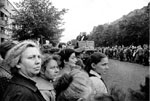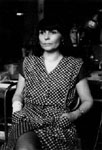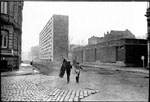 Many
East German photographers banded together in professional support
groups in the late 1950s, including non-conformists like the Leipzig
based Action Fotografie. In spite of the ZKF's call to photographers
"to serve to render our present and our life even more beautiful,"
(DF 8/60, p. 292) the non-conformists insisted that life and truth
were more complicated than the "smooth, happy pictures"
of socialist realism (DF 11/56, p. 304). Many
East German photographers banded together in professional support
groups in the late 1950s, including non-conformists like the Leipzig
based Action Fotografie. In spite of the ZKF's call to photographers
"to serve to render our present and our life even more beautiful,"
(DF 8/60, p. 292) the non-conformists insisted that life and truth
were more complicated than the "smooth, happy pictures"
of socialist realism (DF 11/56, p. 304).  The
detachment that these artists cultivated in the early years of the
GDR undermined the visual uniformity of socialist culture in the media,
and may have contributed to the editorial takeover of Die Fotografie
by the ZKF in 1960. Throughout the 1960s and '70s, both as independent
artists and as faculty at the Hochschule für Grafik und Buchkunst
in Leipzig, they quietly spread their dissatisfaction with socialist
aesthetics to their students, building a foundation for the more directly
confrontational images of later generations of photographers. While
seeming to adhere to the Soviet standard of humanistic art, work from
this period by artists such as Arno Fischer and Evelyn Richter is
characterized by a studied ambivalence toward its subjects. The
detachment that these artists cultivated in the early years of the
GDR undermined the visual uniformity of socialist culture in the media,
and may have contributed to the editorial takeover of Die Fotografie
by the ZKF in 1960. Throughout the 1960s and '70s, both as independent
artists and as faculty at the Hochschule für Grafik und Buchkunst
in Leipzig, they quietly spread their dissatisfaction with socialist
aesthetics to their students, building a foundation for the more directly
confrontational images of later generations of photographers. While
seeming to adhere to the Soviet standard of humanistic art, work from
this period by artists such as Arno Fischer and Evelyn Richter is
characterized by a studied ambivalence toward its subjects.  The
presence of non-conformists in the seemingly fixed field of photography,
and their move toward a more objective vision, resulted in an ideological
divide among photographers that grew increasingly profound with the
passage of time. The
presence of non-conformists in the seemingly fixed field of photography,
and their move toward a more objective vision, resulted in an ideological
divide among photographers that grew increasingly profound with the
passage of time.
|

 Many
East German photographers banded together in professional support
groups in the late 1950s, including non-conformists like the Leipzig
based Action Fotografie. In spite of the ZKF's call to photographers
"to serve to render our present and our life even more beautiful,"
(DF 8/60, p. 292) the non-conformists insisted that life and truth
were more complicated than the "smooth, happy pictures"
of socialist realism (DF 11/56, p. 304).
Many
East German photographers banded together in professional support
groups in the late 1950s, including non-conformists like the Leipzig
based Action Fotografie. In spite of the ZKF's call to photographers
"to serve to render our present and our life even more beautiful,"
(DF 8/60, p. 292) the non-conformists insisted that life and truth
were more complicated than the "smooth, happy pictures"
of socialist realism (DF 11/56, p. 304).  The
detachment that these artists cultivated in the early years of the
GDR undermined the visual uniformity of socialist culture in the media,
and may have contributed to the editorial takeover of Die Fotografie
by the ZKF in 1960. Throughout the 1960s and '70s, both as independent
artists and as faculty at the Hochschule für Grafik und Buchkunst
in Leipzig, they quietly spread their dissatisfaction with socialist
aesthetics to their students, building a foundation for the more directly
confrontational images of later generations of photographers. While
seeming to adhere to the Soviet standard of humanistic art, work from
this period by artists such as Arno Fischer and Evelyn Richter is
characterized by a studied ambivalence toward its subjects.
The
detachment that these artists cultivated in the early years of the
GDR undermined the visual uniformity of socialist culture in the media,
and may have contributed to the editorial takeover of Die Fotografie
by the ZKF in 1960. Throughout the 1960s and '70s, both as independent
artists and as faculty at the Hochschule für Grafik und Buchkunst
in Leipzig, they quietly spread their dissatisfaction with socialist
aesthetics to their students, building a foundation for the more directly
confrontational images of later generations of photographers. While
seeming to adhere to the Soviet standard of humanistic art, work from
this period by artists such as Arno Fischer and Evelyn Richter is
characterized by a studied ambivalence toward its subjects.  The
presence of non-conformists in the seemingly fixed field of photography,
and their move toward a more objective vision, resulted in an ideological
divide among photographers that grew increasingly profound with the
passage of time.
The
presence of non-conformists in the seemingly fixed field of photography,
and their move toward a more objective vision, resulted in an ideological
divide among photographers that grew increasingly profound with the
passage of time.